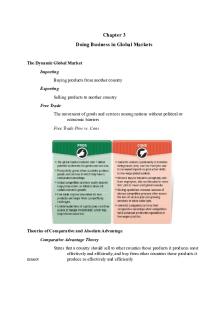Verbs + -ing -enjoy doing, stop doing, etc PDF

| Title | Verbs + -ing -enjoy doing, stop doing, etc |
|---|---|
| Course | Anglais |
| Institution | Université Paris-Est Créteil Val de Marne |
| Pages | 1 |
| File Size | 122.7 KB |
| File Type | |
| Total Downloads | 100 |
| Total Views | 135 |
Summary
Fiche de cours pour les verbes + -ing -enjoy doing, stop doing,...
Description
Verb + -ing A.
(enjoy doing / stop doing, etc.)
Look at these examples
I enjoy reading (not I enjoy to read) Would you mind closing the door? (not mind to close) Peter suggested going to the cinema. (not suggested to go)
After enjoy, mind and suggest we use –ing (not to …) Some more verbs that are followed by –ing:
stop postpone admit avoid imagine finish consider deny risk fancy Suddenly everybody stopped talking. There was silence. I will do the washing-up when I have finished cleaning the flat. He tried to avoid answering my question. I don’t fancy going out this evening. (= I am not enthusiastic about it.) Have you ever considered going to live in another country? When I am on holiday I enjoy not having to get up early. (negative form is not –ing)
B. We also use –ing after: give up (= stop) go on / carry on (=continue)
put off (=postpone) keep or keep on (=do something continuously or repeatedly I have given up reading newspapers. I think it’s a waste of time. Mary doesn’t want to retire. She wants to go on working (or carry on working). You keep interrupting when I am talking! or You keep on interrupting …
C.
With some verbs you can use the structure verb + somebody + -ing: I cannot imagine John riding a bicycle. You can’t stop me doing what I want. ‘Sorry to keep you waiting so long.’ ‘That’s all right.’ Note the passive form: I don’t mind being kept waiting. (= I don’t mind people keeping me waiting.) D. When you are talking about finished actions you can say having done / stolen/said etc.
They admitted having stolen the money.
But it is not necessary to use having (done) : you can also say:
They admitted stealing the money. I now regret saying (or having said) what I said.
E. After some of the verbs on this page (especially admit/deny/suggest) you can also use that… They denied that they had stolen the money (or They denied stealing …) Sam suggested that we went to the cinema. (or Sam suggested going …)...
Similar Free PDFs

Doing evidence 2
- 5 Pages

Doing Justice Notes
- 35 Pages

Doing business in cambodia
- 69 Pages

Doing Business in APAC
- 24 Pages

Material What are you doing
- 38 Pages

Ikea doing business in vietnam
- 28 Pages

DOING BUSINESS IN AMERICA 1
- 3 Pages

Habit Tracker FOR doing your mom
- 3 Pages
Popular Institutions
- Tinajero National High School - Annex
- Politeknik Caltex Riau
- Yokohama City University
- SGT University
- University of Al-Qadisiyah
- Divine Word College of Vigan
- Techniek College Rotterdam
- Universidade de Santiago
- Universiti Teknologi MARA Cawangan Johor Kampus Pasir Gudang
- Poltekkes Kemenkes Yogyakarta
- Baguio City National High School
- Colegio san marcos
- preparatoria uno
- Centro de Bachillerato Tecnológico Industrial y de Servicios No. 107
- Dalian Maritime University
- Quang Trung Secondary School
- Colegio Tecnológico en Informática
- Corporación Regional de Educación Superior
- Grupo CEDVA
- Dar Al Uloom University
- Centro de Estudios Preuniversitarios de la Universidad Nacional de Ingeniería
- 上智大学
- Aakash International School, Nuna Majara
- San Felipe Neri Catholic School
- Kang Chiao International School - New Taipei City
- Misamis Occidental National High School
- Institución Educativa Escuela Normal Juan Ladrilleros
- Kolehiyo ng Pantukan
- Batanes State College
- Instituto Continental
- Sekolah Menengah Kejuruan Kesehatan Kaltara (Tarakan)
- Colegio de La Inmaculada Concepcion - Cebu







